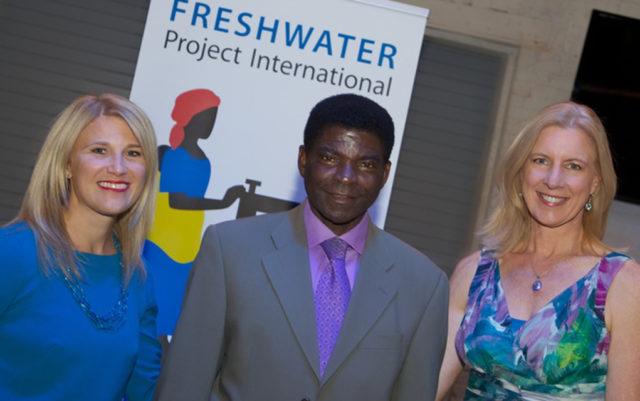
Sitting in class, studying for a bachelors’ degree in business at the University of Kansas, Heidi Rickels felt her heart beating faster every time the professors talked about developing economies or international issues. So, after graduation, she moved to Colorado and began working for a nonprofit based in Denver that collects donated medical supplies to send overseas. While there, Rickles participated in a mentorship program for water professionals from developing countries. And that’s where she met Charles Banda from Malawi.
“I was supposed to be mentoring him, but I always say he was kinda my life mentor,” Rickels says. “Just even being connected with him, even as a friend, was an inspiration. It really changed my outlook on what I was doing and how I was doing it, to think of people first.”
Having grown up in villages that lacked access to clean water himself, Banda founded Freshwater Project Malawi in 1995, seeking to build wells throughout his impoverished country. And as Rickels began working with Banda, she learned a startling statistic — up to 70 percent of people in healthcare facilities in developing countries have a preventable waterborne illness, Malawians included. Motivated by Banda’s work, Rickels co-founded Freshwater Project International (FPI) with filmmaker Amy Hart in 2012. Hart also features Banda in her documentary Water First, which focuses on global water issues. Together, Rickels and Hart began brainstorming a way to support Banda in his efforts to bring clean water to citizens of Malawi.
The country, landlocked between Tanzania, Zambia and Mozambique, is often termed the “warm heart of Africa” because it is a place of little civil unrest. However, Malawi is one of the world’s least developed countries and its rural population mainly survives as part of the agrarian economy. And Malawi relies heavily on foreign aid, which has been steadily decreasing since 2000.
“We want to make an impact, but we want to do that by empowering people in Malawi,” Rickels says. FPI chooses projects based on community requests and commitment to participate in the work, while giving them ownership of the project both during and after the construction phase. In doing this, FPI partners with local communities helping them obtain the same rights and access to clean water and hygienic sanitation that Americans might take for granted. Access to clean water ties into many developmental issues such as education, and FPI projects specifically focus on schools and health centers.
Currently, FPI is working to bring hygienic systems to five schools near the capital city Lilongwe. FPI also plans to drill a new well and put in sanitation and hand-washing facilities at each location. By partnering with outside organizations, FPI is able to provide the students tools for water purification at home while offering hygiene education in the classroom. One school has already been sponsored by a church from Golden and another by a middle school in Iowa, and Rickels hopes to find more schools in Colorado to partner with FPI projects through its Adopt-a-School initiative.
Unfortunately, Banda passed away in 2013 after battling liver cancer, but not before providing more than 1 million people with access to clean water through his work. In his memory, FPI continues its work in Malawi. While Rickels runs outreach and administration out of an office in Golden, the new country director, Henrick Kunkeyani works in Malawi as a liaison between the community and the government, overseeing FPI projects on the ground. Although she has never traveled to Malawi herself, Rickels is dedicated to supporting Kunkeyani and FPI’s work in the country, while raising awareness of water and sanitation issues at home.
“I think that my approach has changed in that where you think ‘Oh, if I just write a check or I just donate some clothes that get sent over, that will make an impact,’” Rickels says. “[The experience working with FPI has] really been one that’s made me become even more interested in how we can work together to grow and to learn and make people’s lives better, both here and there.”














